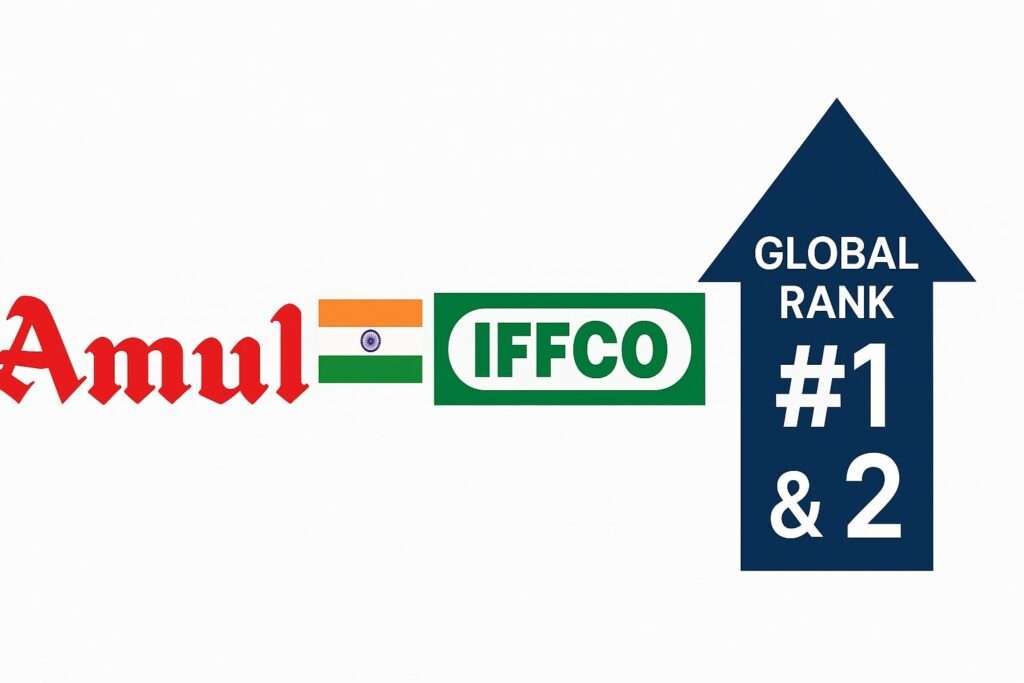EaseMoney News Desk — India’s cooperative movement has just made global headlines. Two of India’s biggest and trusted cooperatives, the names are Amul and IFFCO.
They achieved an extraordinary milestone in November, they securing the 1st and 2nd ranks globally in the International Cooperative Alliance (ICA) World Cooperative Monitor 2025.
Prime Minister Narendra Modi tweeted and called it = “This is a landmark achievement”, saying the cooperative sector is not only vibrant but also transforming millions of lives. The tweet, marked with the viral hashtag #PMModiWithCooperative, celebrated the success of both organisations and reaffirmed the government’s focus on “Sahkar Se Samriddhi” — prosperity through cooperation.
Congratulations to Amul and IFFCO. India’s cooperative sector is vibrant and is also transforming several lives. Our Government is taking numerous steps to further encourage this sector in the times to come. https://t.co/pocw6n1Q11
— Narendra Modi (@narendramodi) November 5, 2025
“Congratulations to Amul and IFFCO. India’s cooperative sector is vibrant and transforming several lives. Our government is taking numerous steps to further encourage this sector,” PM Modi posted on X.
Global Recognition and India’s Rise
The International Cooperative Alliance. Based in Brussels, they collect the top 300 cooperatives or firms’ data, with a major focus on turnover, membership, and impact from countries.
This year, Amul (Gujarat Cooperative Milk Marketing Federation) topped the list from 195 countries, followed closely by IFFCO (Indian Farmers Fertiliser Cooperative Limited).
Let’s explore what makes this recognition so special – THE WCM LIST below –
| Organisation | Global Rank (2025) BY TURN OVER ONLY | Members OR Producers | The Key Focus Area |
|---|---|---|---|
| Amul (GCMMF) | 1 | 3.6 million milk producers | Dairy, food processing, exports |
| IFFCO | 2 | 50 million farmers (36,000+ societies) | Fertilisers, agri-tech, sustainability |
| Groupe Crédit Agricole (FRANCE) | 3 | ||
| Top 300 Co-ops (Global) | — | — | USD 2.79 trillion combined turnover |
According to ICA, the agriculture and food sector represents nearly 35.7 % of total cooperative turnover globally — proof that rural, community-based models still power a large part of the world’s economy.
The Story Behind the Success
First of all, Amul and IFFCO aren’t just brands — they’re social movements.
- Amul, born out of India’s White Revolution, now covers 18,600 village dairy cooperatives and exports to more than 50 countries.
- IFFCO, founded in 1967, operates five major fertiliser plants and reaches almost one in every three Indian farmers.
Here’s a quick snapshot of their scale
| Parameter | Amul (FY 2024–25) | IFFCO (FY 2024–25) |
|---|---|---|
| Annual Turnover | ₹61,000 crore | ₹62,000 crore |
| Export Presence | 50+ countries | 25+ countries |
| Employees | 1.5 lakh (direct + indirect) | 40,000 + |
| Member Reach | 3.6 million | 50 million farmers |
Why It Matters for India’s Economy
So, when India’s cooperatives top global charts, it’s not just about pride or growth, it’s purely about proof that community capitalism works.
Furthermore, the Ministry of Cooperation, which is led by Amit Shah, has introduced reforms like –
- National Cooperative Database,
- multi-state co-op modernisation,
- digital governance tools to strengthen transparency and profitability.
What if this global recognition sparks a new wave of cooperative entrepreneurship? That could mean more local wealth creation, better farmer income, and stronger rural markets. The aim for VOCAL FOR LOCAL.
EaseMoney View
Here, India’s cooperative story is more than a headline — it’s a reminder that grassroots business models can rival global corporations.
As PM Modi said, this is not just recognition for Amul and IFFCO — it’s the world acknowledging India’s “Sahkar Se Samriddhi” journey.
More Business Updates – “If You’re 25 and Going to an MBA College, You Must Be Some Kind of Idiot”: Nikhil Kamath’s Remark Divides India

